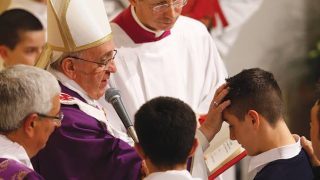
THE ANGEL’S CANDLE: PEACE
HOMILY FOR FOURTH SUNDAY OF ADVENT, YEAR C. Readings: Micah 5:2-5; Psalm 80; Hebrews 10:5-10 and Luke 1:39-45.
As we approach the end of the season of Advent, we recall it is divided in to two parts: (from the 1st Sunday to the 16th of December, and from the 17th to 24th December). We remember the three dimensions of Christ’s coming: in incarnation, through the sacraments and His coming in majesty at the end of time. While the first part of advent focused on his coming in majesty, the second part emphasizes His incarnation, which helps us to reflect on the Angel’s Candle, as regards the visitation of the Angel to Mary and Mary’s visit to her cousin Elizabeth. In view of this, we light the fourth candle of Advent today which symbolizes peace.
In the first reading, the prophet Micah tells us that the Lord keeps His promises. God promised to send a Redeemer who will save his people from sin and in this reading, he announced the birthplace of the Redeemer through the prophet Micah. He said, “You, O Bethlehem Ephrathah, who are little to be among the clans of Judah, from you shall come forth from me one who is to be ruler of Israel, whose origin is from of old, from ancient days.” His promise will be fulfilled with a new leader in the lineage of David. This leader will rise, not from Jerusalem, the royal city, but from a small village. He will not exercise military might like the Assyrian king Senacherib who carried out military campaigns and attacked several towns in Judah (2 Kings 18-19) but will be one of peace who provides for his people like a shepherd. The image of this ruler has an allusion to David whose occupation was shepherding and was born from this little village. So it is with Christ, a descendant of David, born in Bethlehem. However, we cannot limit Christ’s origin to Bethlehem. The prophet went further to tell us that His origin is from of old, from ancient days. Like the circular shape of the Advent Wreath, Christ as God has no beginning nor end. Before he was born in Bethlehem, he has always existed as the second person of the Blessed Trinity (John 17:5; 24).
Bethlehem was well known as the hometown of David, Israel’s greatest king; yet it was never a great or influential city but God chose it as the birthplace of the Ruler of Israel. When King Herod made enquiry of where the Messiah is to be born, he was told Bethlehem of Judea as it was written by the Prophet Micah (Mathew 2:5-6). The prophet Micah combines two words to describe the birthplace of Christ, ‘Bethlehem Ephrathah,’ which signifies the ‘old and new.’ Bethlehem in itself means ‘House of Bread’ and Jesus Christ is the bread of life (John 3:35). Ephrathah was the old name of the place, which means ‘faithfulness’ or ‘abundance.’ Invariably, the prophet Micah assures us that God is faithful to his promises and his words are certain. He fulfils his promises in unexpected and unpredictable ways. He urges us not to only seek Christ among the prominent and in magnificent places or people, but also among the poor, the powerless and vulnerable. We can find Christ in little and humble places as he identified Himself with such on various occasions.
The Gospel fulfills the prophecy of Micah as Luke tells us how two insignificant women had come together to celebrate the faithfulness of God. These women are Mary and Elizabeth, and their binding force is the Holy Spirit. Mary conceived by the power of the Holy Spirit (Luke 1:35), Elizabeth was filled with the Holy Spirit (Luke 1:41). Right in the womb of Elizabeth, John the Baptist felt the power of the Holy Spirit and leaped for joy. He recognized the presence of Jesus in the womb and would be the first to recognize Him as the Lamb of God (John 1:29). This brings to mind the sacrificial gift Mary offered to her cousin. She was sensitive to the needs of her cousin who became pregnant miraculously in her old age and so she made herself available to assist her.
In a parallel line with the first reading, while the prophet Micah prophesies of the uncommon or ordinary city of Bethlehem as the birthplace of the Messiah, in the Gospel, God singled out an ordinary woman like us and made her extraordinary in carrying out the salvific mission. This pericope portrays Mary as the first missionary to take Jesus to her cousin Elizabeth. This journey has enormous significance: we see the movement of Mary’s journey to the hill country and the movement of the Ark of the Covenant, which was on the hill of the house of Abinadab (2 Samuel 6:3). Both the Ark and Mary remained in the hill country for three months (2 Samuel 6:11). Both were greeted with ‘Shouts of joy.’ While David danced round the Ark, John leaped for joy in the womb before the Ark of the new Covenant (2 Samuel 6:5; Luke 1:41). In view of this, Elizabeth said, “Blessed is she who believed that there would be a fulfillment of what was spoken to her from the Lord.”
This season of Christmas is the ideal time for us to carry Jesus to others as Mary did. It is time we remember and visit the less privileged as God did to the city of Bethlehem and to fallen humanity. It is time we visit the sick, the aged and those who probably have no one to care for them. This is the time we give room for the Holy Spirit to fill our hearts and let Christ be reborn in us. When we engage ourselves with the act of sharing our time and resources, we make manifest the Word Incarnate. The Spirit of God drives us to works of charity, love and sacrifice, and eventually gives us peace. It is on this note that in the words of the second reading like Mary we can say to God, “Behold I come to do your will.”
Dear friends in Christ, the liturgy of today urges us to allow God dwell in our hearts just as Mary did. When God dwells therein, we will have peace. Amazingly, Mary has the sweet title, “Queen of peace.” May the peace of Christ reign in our hearts both now and forever. Amen! Peace be with you!
Happy Sunday!
Fr. Ken Dogbo, OSJ










